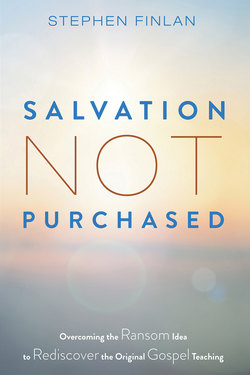Читать книгу Salvation Not Purchased - Stephen Finlan - Страница 5
На сайте Литреса книга снята с продажи.
Preface
ОглавлениеAs a pastor, I am concerned about the truly harmful effect that certain Christian beliefs are having on believers. Specifically in the area of atonement (“Jesus died for your sins”), there are some unhealthy, untrue, and unbiblical notions that are causing distress and confusion among Christians. It is my pastoral concern that drives me to speak up about these troubling beliefs.
One such idea is the notion that salvation was “purchased with blood,” that we are saved only because Jesus bled and died for us. Now, this says something good about Jesus (that he died heroically for others), but it implies something horrible about God the Father who would require such a sacrificial “price” or “ransom.” This would place a huge gulf between a stern Father and a merciful Son, which deeply contradicts the Bible. Many Christians need to face the fact that they have accepted the notion of a spiteful and violent God, an idea that goes against Jesus’ own teachings. This concept teaches us to be afraid of God, uncertain about the afterlife, and judgmental toward others—in direct contrast to the spirit and the content of what Jesus taught.
Since this is a problem with beliefs—with ideas that some Christians have about God—I will investigate the development of these beliefs, but my real interest is spiritual. Belief is mental, having to do with concepts and doctrines held by the mind. Faith is spiritual and relational; it concerns one’s spiritual health, one’s relationship with God, and how one treats others. Since actual spiritual values and loyalties are more important than mental notions, it is fair to say that faith is deeper than belief.
But beliefs still matter! Unexamined beliefs can do damage to people’s faith, leaving people confused about what God is like, and making it hard to trust God. As a result of distorted beliefs, sometimes even conflicting beliefs, many believers become discouraged, and some even lose their faith, or at least lose confidence about their faith. Furthermore, as mentioned, our faith-relationship with God has a deep effect on our relationships with people. If we believe that God is vengeful and cruel, we might allow ourselves to be vengeful as well, and use our beliefs to justify our nastiness. Violent God-concepts do real and lasting harm, psychologically and ethically. If we fail to recognize God as a loving parent, we will make many wrong assumptions about God.
And so, it is in order to help people’s faith that I am willing to critique some widely accepted beliefs. If your faith is strong enough to allow you to delve into doctrine without feeling threatened, then this book is for you. If you want to remain safe in your assumptions without examining them, without holding them up to the light of what Jesus said, then this book is not for you. I am asking that we question some of the things that are commonly said about God, so that we may really “understand these things” (John 3:10).1
This is a plea to my fellow Christians for us to be thoughtful as well as heartfelt in our beliefs. It is really a plea for us to love God with all our minds, as well as with all our hearts and souls (Matt 22:37). If we love God will all our minds and hearts, we will be unafraid to examine a serious problem that has become lodged within Christian belief.
Let us dive in.
